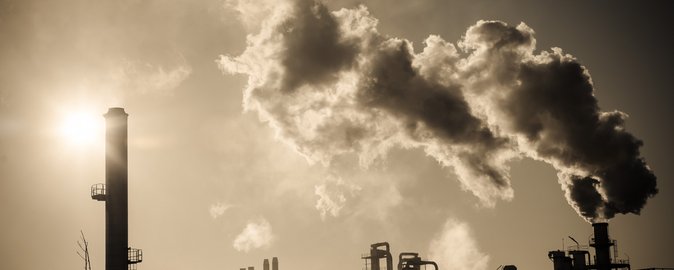- Education
-
Research
Current research
Talent
-
Collaboration
Businesses
Government agencies and institutions
Alumni
-
About AU
Organisation
Job at AU
World leaders are unable to agree on a joint global climate policy. If we seriously want to reduce the world’s CO2 emission, we should be focusing instead on the contracts made by companies in Europe and the USA with their suppliers in developing countries. Research shows that large amounts of CO2 could be saved.
2013.10.04 |

Until now, we have tried to reduce CO2 emission by focusing on joint global legislation in this area. However, this does not appear to be working. PhD student Katerina Peterkova has shown that it could be an advantage to focus on corporate contracts as a way to demand less CO2 emission.
When a factory in China emits a sizeable amount of CO2 into the atmosphere, it can result in tornadoes in the USA. The climate problem is global,but the countries of the world are unable to reach agreement on a global solution.
Instead, they have different regulations regarding how much CO2 companies may emit. But what is the use of strict regulations for CO2 emission in a country like Denmark if Danish companies move their production to a country that allows significantly more CO2 emission? This brings us back to square one.
Katerina Peterkova has studied law, and she has just submitted her PhD dissertation on sustainability.Her work included studies of a new type of CO2 regulation that could provide better results internationally than agreements and regulations within the individual countries. She proposes taking a look at the companies’ agreements with their suppliers.
“When Danish companies move their production to a country like China, they must have a contract with the supplier. In this regard, it could be an advantage if they influenced the supplier to emit less CO2, for example by writing that they’ll only approve a supplier that reduces their emission of CO2 by five per cent per year,” she says.
More and more companies in Europe and the USA are already using their contracts with suppliers in developing countries to reduce CO2 emission – partly because they are under pressure from consumers, NGOs and investors in their own countries.
And this is the way ahead, according to Katerina Peterkova. “However, the countries’ governments must to a greater extent help the companies to include demands for less CO2 emission in their contracts and to do so in a standardised way,” she says.
“One option is that the governments ask the companies to report what efforts their suppliers are making to reduce their CO2 emission.At the same time, the governments could advise the companies and provide them with financial incentives to include CO2 emission requirements in their contracts,” she adds.
Katerina Peterkova tried to calculate the amount of CO2 emission that could be saved if the companies systematically made demands on their suppliers regarding their CO2 emission. Her findings include estimates for specific industries, including the food and drink industry, which emits a considerable amount of CO2.
“If the world’s eight largest companies in this branch – including Danone and Coca-Cola – demanded that their suppliers reduce CO2 emission by ten per cent, it would be the equivalent of saving the annual CO2 emission from an entire country like Greece. It would really make a difference,” she says.
Katerina Peterkova’s research results were presented at the Science for the Environment conference, which attracted approximately 150 participants from all over the world to Aarhus University last Thursday and Friday.
Ph.d. Katerina Peterkova, Aarhus University, School of Business and Social Sciences, Department of Law, Tel. +45 87165186, katpe@asb.dk